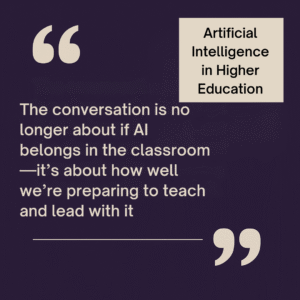The pace of AI adoption in higher education isn’t slowing down—and the gap between what learners need and what institutions offer is becoming harder to ignore. From major universities launching AI colleges and research hubs, to faculty raising concerns over governance, pedagogy, and trust, the conversation is no longer about if AI belongs in the classroom—it’s about how well we’re preparing to teach and lead with it.
This week’s news covers everything from large-scale institutional shifts to quiet faculty resistance, from emerging student skill gaps to bold global expansion moves. Whether you’re building curriculum, shaping policy, or just trying to make sense of it all—these updates are designed to help you connect what’s happening out there to the choices you make right here.

Counting the gap: Universities meet just 0.2% of AI training demand
Validated Insights reports that while 57 million U.S. adults want to upskill in AI, only 7,000 are enrolled in university credit-bearing AI programs; the rest rely on MOOCs like Coursera or Udemy (Jack, 2025)
The Details
- 3.5 million enrollments in generative AI courses on MOOCs within 14 months of ChatGPT.
- Few institutions offer full AI degrees—SUNY Buffalo’s master’s cohort has grown modestly.
- The majority of demand is unmet by traditional higher education.
Why It Matters
Highlights urgent institutional need for faculty to lead scalable, credit-bearing curricula and research-aligned credentials in AI, bridging gaps in academic writing and strategic learning design.
Major demand–supply gap: universities serve only a fraction of AI learning needs
A Validated Insights report finds nearly 57 million adults in the U.S. want AI training, but only about 8.7 million are enrolled—and traditional universities account for just a small portion (Inside Higher Ed, 2025)
The Details
- There is massive demand, but only a minority of learners take credit-bearing university AI courses.
- MOOCs account for the largest share of AI upskilling.
- Higher education institutions remain slow to scale offerings.
Why It Matters
Faculty and leaders must build scalable, credentialed AI curricula that align with research writing, innovation strategies, and professional development in the digital age.
UCF launches university-wide Institute of Artificial Intelligence to unite research and pedagogy
The University of Central Florida has officially inaugurated its Institute of Artificial Intelligence, consolidating more than 25 faculty members across disciplines to spearhead research, curriculum innovation, and partnerships in areas such as computer vision, robotics, healthcare AI, and fintech (UCF, 2025)
The Details
- Cross-college institute serves as a hub for AI education and discovery.
- Emphasis on collaboration, curricular pilots, and real-world applications.
- Targets recruitment of additional AI scholars and coordination of grant proposals.
Why It Matters
A strategic institution-building move that elevates faculty-driven AI scholarship, supports integration of AI literacy in teaching, and fosters innovation in faculty development and academic writing-research workflows.
UTSA transitions School of Data Science into Center, launches College of AI, Cyber & Computing
The University of Texas at San Antonio is restructuring—creating a Center for Data Science as a research node within the newly formed College of AI, Cyber and Computing, launching Fall 2025 (UTSA, 2025)
The Details
- Center will engage 50+ faculty from seven colleges, maintain experiential research and consulting roles.
- College to enroll over 5,000 students and house data science legacy programs.
- Industry partnerships and interdisciplinary funding pipelines are planned.
Why It Matters
This structural reimagination supports faculty capacity-building, cross-disciplinary instruction, and alignment of academic writing and research initiatives with evolving industry and innovation signals.
Other Stories Making News
AI Policy & Trust in Education
- Study finds students trust AI assistants more when institutional policy is clear – Engineering students reported preferring AI tutors for convenience—but trust and usage were strongly linked to clarity of policy frameworks and instructor guidance (Sajja et al., 2025)
- Students and faculty at IIT Delhi call for actionable AI policy and training – At IIT Delhi, surveys of 427 students and 88 faculty reveal high adoption rates (80% & 77 %), ethical concerns around data privacy, disparity in tool access, and calls for mandatory AI disclosure in academic work (IIT Delhi, 2025)
- Pedagogical agent design study outlines requirements to bridge the faculty AI adoption gap. Researchers highlight how social transparency and user control in chatbot design can help AI-skeptical faculty adopt teaching tools without compromising pedagogical values (Chen et al., 2025).
- Inside Higher Ed: Big Tech & faculty tensions over OpenAI‑Canvas integration – Partnership between OpenAI and Instructure to embed ChatGPT into Canvas is stirring faculty skepticism—educators question whether this automation truly enhances teaching or burdens their workload (Palmer, 2025)
- AI prompt engineering and ethical awareness are now central to student and faculty development – A recent study of 130 students across South Asia and Europe spotlights gaps in AI literacy—including prompt engineering, bias awareness, and understanding AI output—while lecturers emphasized GenAI integration and experiential curriculum design (Krause et al., 2025)
Rethinking Pedagogy in the AI Era
- Inside Higher Ed: Educators call out systemic flaws exposed by AI – Economist Tyler Cowen argues AI reveals the hollowness of traditional educational models—calling for mentorship-centered instruction over rote assessments and standardized testing approaches (Spirlet, 2025)
- Vinod Khosla argues AI-driven tutoring may render traditional college degrees obsolete – Venture capitalist Vinod Khosla predicts that AI-powered personalized learning will surpass human educators, reshaping higher education by making conventional university degrees unnecessary (Khosla, 2025)
- OpenAI emphasizes ChatGPT as a learning tool—not an answer machine – OpenAI’s Vice President of Education, Leah Belsky, recently stressed that ChatGPT should be used in classrooms to foster critical thinking and AI fluency, framing AI as a tool akin to a calculator and introducing Study Mode to facilitate reflective learning rather than shortcuts (Belsky, 2025)
- OpenAI launches “Study Mode” in ChatGPT to promote meaningful engagement in learning – OpenAI’s new Study Mode transforms ChatGPT from a shortcut tool into an active learning guide by prompting reflection and staged reasoning instead of offering instant answers (Guardian, 2025)
AI Globalization & Commercial Models
- Billionaire leads AI‑driven expansion of Arden University for global education market – Former SoftBank exec Marcelo Claure has acquired a 50% stake in UK-based Arden University to build a global AI-empowered education network, deploying AI translation and individualized tutoring to scale curriculum delivery in 150 languages across international markets (Claure, 2025)
- Chinese elite universities expand AI-related enrollment in alignment with national strategic goals – Top-tier Chinese universities like Peking University and Shanghai Jiao Tong are increasing undergraduate enrollment in AI and related disciplines to bolster national innovation capacity (Reuters, 2025)
All sources are hyperlinked in-text for immediate access to original publications.
About the Author
Lynn F. Austin is an author, speaker, and educator dedicated to helping others achieve their highest potential. With a strong foundation in faith, Lynn combines her expertise in business, doctoral work in AI strategy and innovation in higher education, and a deep passion for growth and development. Her proven leadership in education and innovation makes her a trusted speaker, coach, and business consultant.
A valued voice in both academic and business circles, Lynn is a frequent writer on AI in higher education and the author of The BOM: Betting on Me, The Newman Tales series, and other business, motivational, and faith-based books. She empowers professionals, educators, and students alike to thrive with purpose and lead with wisdom.

